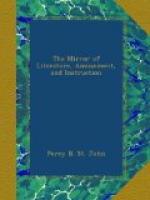After the Britons retired into Wales, it was enacted that no man should guide a plough that could not make one; and that the driver should make the ropes of twisted willows, with which it was drawn. It was usual for six or eight persons to form themselves into a society for fitting out one of these ploughs, providing it with oxen, and every thing necessary for ploughing; and many curious laws were made for the regulation of such societies. If any person laid dung on the field with the consent of the proprietor, he was by law allowed the use of that land for one year. If the dung was carried out in a cart in great abundance, he was to have the use of the land for three years. Whoever cut down a wood, and converted the ground into arable, with the consent of the owner, was to have the use of it for five years. If any one folded his cattle for one year, upon a piece of ground belonging to another, with the owner’s consent, he was allowed the use of the ground for four years. Thus, though the Britons had in a great measure lost the knowledge of agriculture, they appear to have been very assiduous in giving encouragement to such as would attempt the revival of it.
T. Gill.
* * * * *
THE SELECTOR; AND LITERARY NOTICES OF NEW WORKS.
LANDERS’ DISCOVERY OF THE TERMINATION OF THE NIGER.
We continue our extracts from this very entertaining work, the following being from the second volume.
At Boossa, the travellers receive a visit from “the noted widow Zuma.” She must be an Amazonian lady, for, having quarrelled with her prince, the ruler of Wowow, she was obliged to fly, and actually to climb over the city wall in the night, and travel on foot to Boossa. Female politicians in Africa are not so safe as in the coteries of civilized Europe: they have to fight their own battles, and we conclude, to raise their own supplies: “the widow complained sadly of poverty and the hardness of the times; she had fought with the Yarribeans against Alorie; but instead of receiving a recompense for her bravery, she had lost half her slaves in an engagement, which so disgusted her with the military profession, that she immediately abandoned it and returned home. Yet, in spite of all her losses and misfortunes, she has gained so much in corpulency, that it was with the utmost difficulty, she could squeeze herself into the doorway of our hut, although it is by no means small. The widow Zuma is a very good-looking, elderly person of matronly appearance. Her skin is of a light copper colour.” Should this meet the eye of any soldier of fortune, &c.
At Boossa, they hear some tidings of
Mungo Park.




